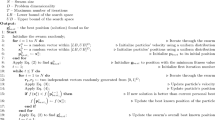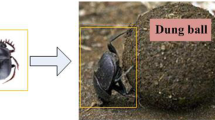Abstract
This paper proposes a new optimization algorithm named future search algorithm (FSA). This algorithm mimics the person’s life. People in the world search for the best life. If any person found that his life is not good, he tries to change it and he imitates the successful persons. According to this behavior, this algorithm is built by mathematical equations. The FSA can update the random initial. Furthermore, it uses the local search between people and the global search between the histories optimal persons to achieve the best solutions. The proposed algorithm does not have tuned parameters. In addition, it has low computational complexity, fast convergence, and high local optima avoidance. The performance of the proposed algorithm is evaluated by applying it to solve some benchmarks test functions. These test functions have various characteristics necessary to evaluate the FSA. In addition, the performance of the proposed algorithm is compared with five other well-known methods. The results confirm a better performance of the proposed algorithm to get the optimal solution with fewer iterations number than other methods.








Similar content being viewed by others
References
Mitchell M (1998) An introduction to genetic algorithms. MIT, London
Basnet C, Weintraub A (2009) A genetic algorithm for a bicriteria supplier selection problem. Int Trans Oper Res 16(2):173–187.
Baker BM, Ayechew MA (2003) A genetic algorithm for the vehicle routing problem. Comput Oper Res 30(5):787–800.
Gehring H, Bortfeldt A (1997) A genetic algorithm for solving the container loading problem. Int Trans Oper Res 4(5-6):401–418.
Poli R, Kennedy J, Blackwell T (2007) Particle swarm optimization. Swarm Intell 1(1):33–57
Van den Bergh F, Engelbrecht AP (2004) A cooperative approach to particle swarm optimization. IEEE Trans Evolut Comput 8(3):225–239.
Passino KM (2002) Biomimicry of bacterial foraging for distributed optimization and control. IEEE Control Syst 22(3):52–67
Das S, Biswas A, Dasgupta S, Abraham A (2009) Bacterial foraging optimization algorithm: theoretical foundations, analysis, and applications. In: Foundations of computational intelligence, vol 3. Springer, Berlin, pp 23–55
Karaboga D, Akay B (2009) A comparative study of artificial bee colony algorithm. Appl Math Comput 214(1):108–132.
Karaboga D, Basturk B (2008) On the performance of artificial bee colony (ABC) algorithm. Appl Soft Comput 8(1):687–697.
Zhu G, Kwong S (2010) Gbest-guided artificial bee colony algorithm for numerical function optimization. Appl Math Comput 217(7):3166–3173.
Montané FAT, Galvao RD (2006) A tabu search algorithm for the vehicle routing problem with simultaneous pick-up and delivery service. Comput Oper Res 33(3):595–619
Grabowski J, Wodecki M (2004) A very fast tabu search algorithm for the permutation flow shop problem with makespan criterion. Comput Oper Res 31(11):1891–1909
Brandão J (2011) A tabu search algorithm for the heterogeneous fixed fleet vehicle routing problem. Comput Oper Res 38(1):140–151.
Atashpaz-Gargari E, Lucas C (2007) Imperialist competitive algorithm: an algorithm for optimization inspired by imperialistic competition. In Evolutionary computation, 2007. CEC 2007. IEEE congress on. IEEE, pp 4661–4667
Rashedi E, Nezamabadi-Pour H, Saryazdi S (2009) GSA: a gravitational search algorithm. Inf Sci 179(13):2232–2248.
Xing B, Gao WJ (2014) Gravitational search algorithm. In: Innovative computational intelligence: a rough guide to 134 clever algorithms. Springer, Cham, pp 355–364
Sharafi Y, Khanesar MA, Teshnehlab M (2016) COOA: competitive optimization algorithm. Swarm Evolut Comput 30:39–63
Shareef H, Ibrahim AA, Mutlag AH (2015) Lightning search algorithm. Appl Soft Comput 36:315–333
Lin D, He L, Feng X, Luo W (2018) Niching pareto ant colony optimization algorithm for bi-objective pathfinding problem. IEEE Access 6:21184–21194
Saremi S, Mirjalili S, Lewis A (2017) Grasshopper optimisation algorithm: theory and application. Adv Eng Softw 105:30–47
Xia X, Gui L, He G, Xie C, Wei B, Xing Y et al (2018) A hybrid optimizer based on firefly algorithm and particle swarm optimization algorithm. J Comput Sci 26:488–500
Brabazon A, Cui W, O’Neill M (2016) The raven roosting optimisation algorithm. Soft Comput 20(2):525–545.
Yazdani M, Jolai F (2016) Lion optimization algorithm (LOA): a nature-inspired metaheuristic algorithm. J Comput Des Eng 3(1):24–36.
Yao X, Liu Y, Lin G (1999) Evolutionary programming made faster. IEEE Trans Evolut Comput 3(2):82–102.
Author information
Authors and Affiliations
Corresponding author
Ethics declarations
Conflict of interest
Authors state that there are no conflicts of interest.
Ethical approval
This article does not contain any studies with human participants performed by any of the authors.
Additional information
Publisher’s Note
Springer Nature remains neutral with regard to jurisdictional claims in published maps and institutional affiliations.
Rights and permissions
About this article
Cite this article
Elsisi, M. Future search algorithm for optimization. Evol. Intel. 12, 21–31 (2019). https://doi.org/10.1007/s12065-018-0172-2
Received:
Revised:
Accepted:
Published:
Issue Date:
DOI: https://doi.org/10.1007/s12065-018-0172-2




